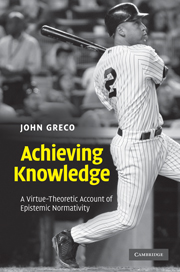1 - Knowledge as success from ability
Published online by Cambridge University Press: 05 June 2012
Summary
THE CENTRAL THESIS
The central thesis of this book is that knowledge is a kind of success from ability. Let us suppose, with Aristotle, that the intellectual virtues are abilities. Then knowledge is a kind of success from virtue. This is a thesis about what knowledge is. More specifically, and more importantly, it is a thesis about the sort of normative status that knowledge requires. The thesis, then, is that knowledge is an instance of a more general normative phenomenon – that of success through ability (or success through excellence, or success through virtue).
Adopting this thesis allows progress on a range of epistemology's problems. Some of these are “problems for everyone.” That is, they are perennial problems of the field that any adequate theory of knowledge must address. Others are “problems for reliabilism.” That is, they are problems that arise for reliabilist theories of knowledge in particular, and that must be addressed if reliabilism is to be a viable approach in epistemology. To that extent, the book can be viewed as an extended defense of reliabilism as a theory of knowledge. In effect, the present approach shows how knowledge can be normative within a reliabilist framework.
Knowledge is a kind of success from ability. This is intended as both an account of knowledge and an account of epistemic normativity. Is it intended as an “analysis” of knowledge? Not in any traditional sense.
- Type
- Chapter
- Information
- Achieving KnowledgeA Virtue-Theoretic Account of Epistemic Normativity, pp. 3 - 16Publisher: Cambridge University PressPrint publication year: 2010



